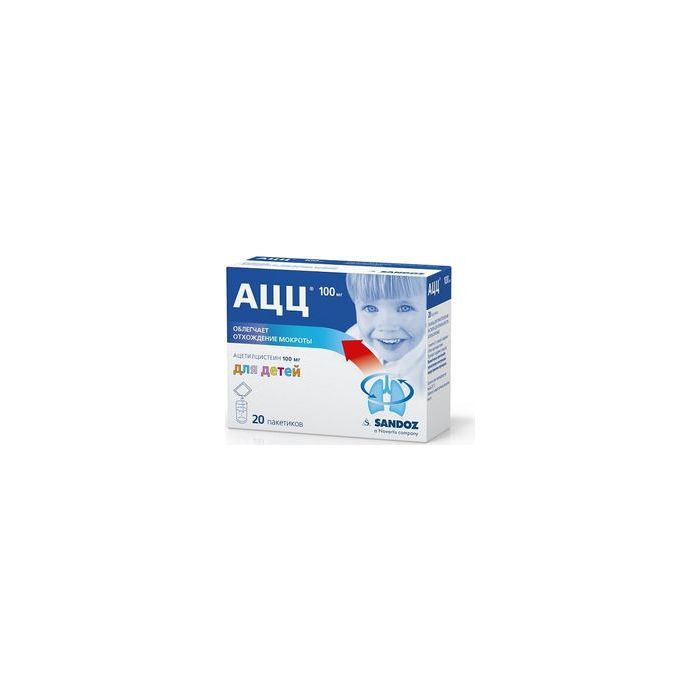ACC Powder for preparation of a solution for internal administration, orange, 100 mg, 3 g packet, No. 20
Category
Thinning phlegm
,
Expectorants
Scope of the drug
Respiratory system
Release form
Powder
Manufacturer country
Germany
Package quantity, pcs
twenty
ACC since.
d / prigot.
solution for internal
reception (orange) 100mg packet 3g No. 20
Name ENG
ACC
Clinical and pharmacological group
Mucolytic drug
ATX code
Acetylcysteine
Dosage
100mg x 3g
Structure
1 sachet contains active ingredient: acetylcysteine ��- 100.0 / 200.0 mg
excipients: sucrose - 2829.5 / 2717.0 mg
ascorbic acid - 12.5 / 25.0 mg
saccharin - 8.0 / 8.0 mg
orange flavor - 50.0 / 50.0 mg
Indications
Diseases of the respiratory system, accompanied by the formation of viscous, difficult to separate sputum:
- acute and chronic bronchitis
- obstructive bronchitis
- tracheitis
- laryngotracheitis
- pneumonia
- lung abscess
- bronchiectasis
- bronchial asthma
- chronic obstructive pulmonary disease
- bronchiolitis
- cystic fibrosis
acute and chronic sinusitis
otitis media (otitis media).
Storage conditions and periods
At a temperature not higher than 25 degrees.
Expiration date: 3 years
Contraindications
For all dosage forms
hypersensitivity to acetylcysteine ��or other components of the drug
peptic ulcer of the stomach and duodenum in the acute stage
hemoptysis, pulmonary bleeding
pregnancy
period of breastfeeding
children under 2 years old.
For effervescent tablets, 100 mg, optional
lactase deficiency, lactose intolerance, glucose-galactose malabsorption.
With care: history of gastric ulcer and duodenal ulcer
bronchial asthma
obstructive bronchitis
hepatic and / or renal failure
histamine intolerance (long-term use of the drug should be avoided, because acetylcysteine ��affects the metabolism of histamine and can lead to signs of intolerance, such as headache, vasomotor rhinitis, itching)
varicose veins of the esophagus
adrenal gland diseases
arterial hypertension.
For granules for solution preparation additionally
deficiency of sucrase / isomaltase, fructose intolerance, glucose-galactose deficiency.
With care: history of gastric ulcer and duodenal ulcer
arterial hypertension
varicose veins of the esophagus
bronchial asthma
obstructive bronchitis
diseases of the adrenal glands
hepatic and / or renal failure
histamine intolerance (long-term use of the drug should be avoided, because acetylcysteine ��affects the metabolism of histamine and can lead to signs of intolerance, such as headache, vasomotor rhinitis, itching).
For syrup additionally
With care: history of gastric ulcer and duodenal ulcer
bronchial asthma
hepatic and / or renal failure
histamine intolerance (long-term use of the drug should be avoided, because acetylcysteine ��affects the metabolism of histamine and can lead to signs of intolerance, such as headache, vasomotor rhinitis, itching)
varicose veins of the esophagus
diseases of the adrenal glands
arterial hypertension.
INN / Active ingredient
Acetylcysteine
Specifications
Category
Thinning phlegm
,
Expectorants
Scope of the drug
Respiratory system
Release form
Powder
Manufacturer country
Germany
Package quantity, pcs
twenty
Scope of application
Virology
Minimum age from
6 years
Way of introduction
Through the mouth
Vacation conditions
Without recipe
Brand name
Lindopharm GmbH DE
The amount of the dosage form in the primary package
3 g
Primary packaging type
Sachet (sachet)
Type of consumer packaging
Pack of cardboard
Pharmaco-therapeutic group
Mucolytic agent
Anatomical and therapeutic characteristics
R05CB01 Acetylcysteine
Packaging
Box
Expiration date in days
1095
The target audience
Children
Dosage (volume) of the substance in the preparation
acetylcysteine ��100 mg
Package weight, g
70
Mode of application
:
The granules should be dissolved in water, juice or cold tea and taken after meals. Additional fluid intake enhances the mucolytic effect of the drug. With short-term colds, the duration of the course is 5-7 days. With long-term illnesses, the course of therapy is determined by the attending physician. In chronic bronchitis and cystic fibrosis, the drug should be taken for a longer time to achieve a prophylactic effect in infections. In the absence of other appointments, it is recommended to adhere to the following dosages: < br> Mucolytic therapy: < br> adults and adolescents over 14 years old: 2 sachets of ACC 100 mg or 1 sachet of ACC 200 mg 2-3 times a day (400-600 mg per day) < br> children from 6 to 14 years old: 1 sachet 3 times a day or 2 sachets 2 times a day ACC 100 mg (300-400 mg per day). < br> ACC 200 mg should be taken 3 times a day, 1/2 sachet or 2 times a day, 1 sachet (300-400 mg per day) Children from 2 to 6 years old: 1 sachet of ACC 100 mg or 1/2 sachet of ACC 200 mg 2-3 times a day (200-300 mg per day). < br> Cystic fibrosis - children over 6 years old: 2 sachets of ACC 100 mg or 1 sachet of ACCВ® 200 mg 3 times a day (600 mg per day) children from 2 to 6 years old: 1 sachet of ACC 100 mg or 1/2 sachet of ACC 200 mg 4 times a day (400 mg per day) patients with body weight? 30 kg: if necessary, it is possible to increase the dose to 800 mg.2 sachets of ACC 100 mg or 1 sachet of ACCВ® 200 mg 3 times a day (600 mg per day) children from 2 to 6 years old: 1 sachet of ACC 100 mg or 1/2 sachet of ACC 200 mg 4 times a day (400 mg per day) patients with body weight? 30 kg: if necessary, it is possible to increase the dose to 800 mg.2 sachets of ACC 100 mg or 1 sachet of ACCВ® 200 mg 3 times a day (600 mg per day) children from 2 to 6 years old: 1 sachet of ACC 100 mg or 1/2 sachet of ACC 200 mg 4 times a day (400 mg per day) patients with body weight? 30 kg: if necessary, it is possible to increase the dose to 800 mg.
Dosage form
:
Powder for oral solution [orange]
Information on technical characteristics, delivery set, country of manufacture

